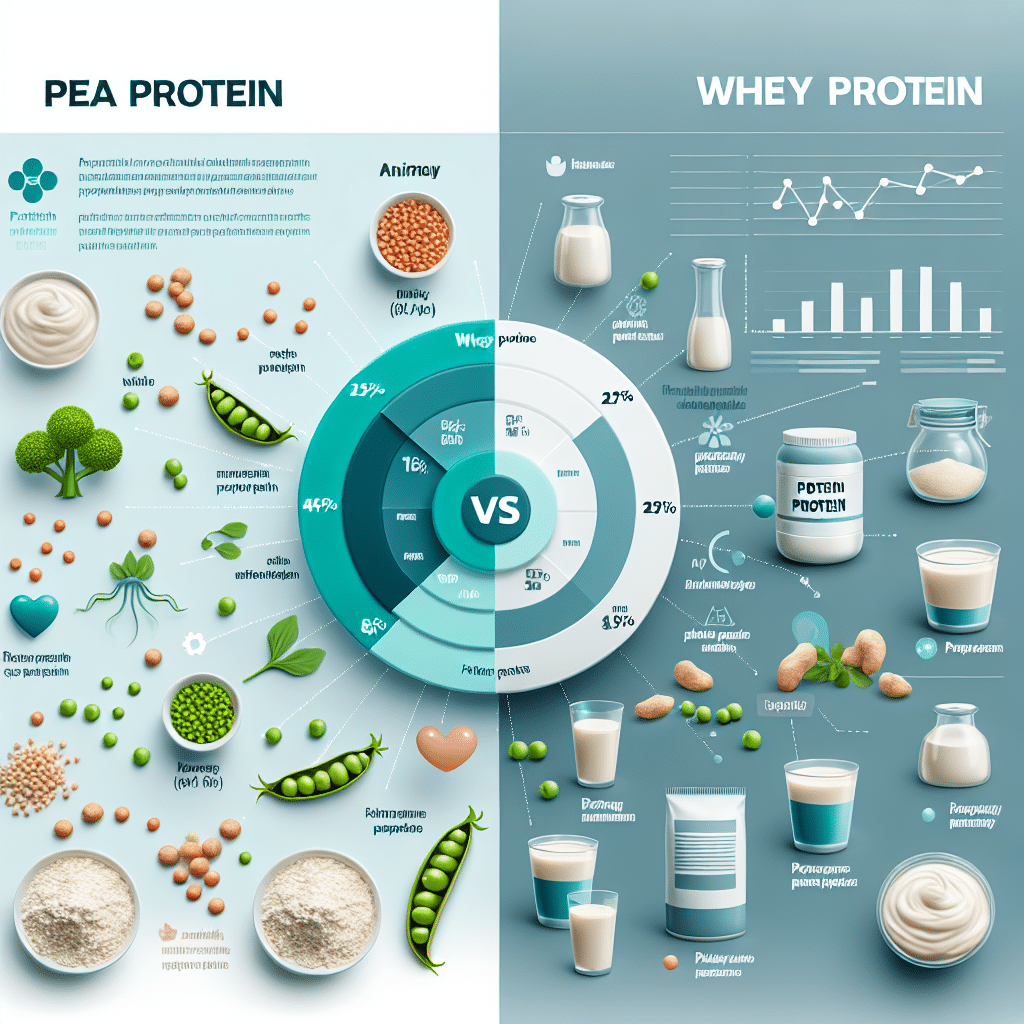Is Pea Or Whey Protein Healthier? Learn More
Table of Contents
- Pea vs. Whey Protein: Which Is the Healthier Choice?
- Understanding Protein Supplements
- Pea Protein: A Plant-Powered Contender
- Whey Protein: The Traditional Powerhouse
- Nutritional Comparison
- Potential Health Impacts
- Case Studies and Research
- Conclusion: Making the Right Choice for Your Health
- Discover ETprotein’s Premium Protein Products
Pea vs. Whey Protein: Which Is the Healthier Choice?

When it comes to protein supplements, the debate between pea and whey protein is ongoing. With the rise of plant-based diets and the quest for sustainable nutrition sources, pea protein has gained popularity. Meanwhile, whey protein has long been the go-to choice for many fitness enthusiasts and athletes. This article delves into the health benefits, nutritional content, and potential drawbacks of both pea and whey protein to determine which might be the healthier option for you.
Understanding Protein Supplements
Protein supplements are a convenient way to ensure adequate protein intake, especially for those with increased requirements or restricted diets. They come in various forms, including powders, bars, and shakes, and are derived from different sources, each with its unique profile of amino acids, the building blocks of protein.
Pea Protein: A Plant-Powered Contender
Pea protein is a high-quality, plant-based protein extracted from yellow split peas. It’s a favorite among vegetarians, vegans, and those with allergies to dairy or soy. Here’s what makes pea protein stand out:
- Hypoallergenic: Pea protein is naturally free from common allergens like gluten, lactose, and soy, making it suitable for people with food sensitivities.
- Environmentally Friendly: As a plant-based protein, pea protein has a lower environmental footprint compared to animal-based proteins, requiring less water and land to produce.
- Rich in Iron: Pea protein is a good source of iron, an essential mineral for oxygen transport and energy production in the body.
- Complete Protein: While many plant proteins lack one or more essential amino acids, pea protein is often fortified to become a complete protein, containing all nine essential amino acids.
However, pea protein may have a grainier texture and a more distinct taste than whey protein, which could be a downside for some users.
Whey Protein: The Traditional Powerhouse
Whey protein is a byproduct of cheese production and is a complete protein containing all essential amino acids. It’s well-known for its high digestibility and rapid absorption, making it a staple in the fitness community. Benefits of whey protein include:
- High Biological Value: Whey protein has a high biological value, meaning it’s efficiently used by the body for muscle repair and growth.
- Rich in BCAAs: Whey is particularly high in branched-chain amino acids (BCAAs), which are crucial for muscle protein synthesis and recovery.
- Supports Immune System: Whey protein contains immunoglobulins and lactoferrin, which can help support the immune system.
- Appetite Suppressant: The high protein content in whey can help reduce hunger and aid in weight management.
Despite its benefits, whey protein is not suitable for everyone. It contains lactose, which can cause digestive issues for those who are lactose intolerant. Additionally, some people may prefer not to consume animal-derived products for ethical or dietary reasons.
Nutritional Comparison
When comparing pea and whey protein, it’s essential to consider their nutritional profiles. Both offer high protein content per serving, but there are differences in their amino acid compositions and additional nutrients.
For example, whey protein typically contains more BCAAs, which are vital for muscle building, while pea protein is richer in arginine, an amino acid beneficial for blood flow and heart health. Pea protein also tends to have more fiber, which can aid in digestion and satiety.
Potential Health Impacts
Both pea and whey protein can contribute to a healthy diet when used appropriately. However, it’s crucial to consider individual health goals and dietary restrictions. For instance, pea protein may be more suitable for those looking to increase their plant-based nutrient intake or reduce their carbon footprint. On the other hand, whey protein might be preferred by those aiming to maximize muscle growth and recovery post-exercise.
Case Studies and Research
Several studies have compared the effects of pea and whey protein on muscle growth, weight loss, and overall health. For example, a 2015 study published in the Journal of the International Society of Sports Nutrition found that pea protein promoted similar muscle gains to whey protein in participants undergoing resistance training.
Another study highlighted that pea protein was just as effective as whey protein in promoting satiety and could be a valuable tool for weight management. These findings suggest that pea protein can be a viable alternative to whey protein for various health and fitness goals.
Conclusion: Making the Right Choice for Your Health
In conclusion, both pea and whey protein have their unique advantages and can be part of a healthy diet. The choice between them should be based on individual dietary needs, health goals, and personal preferences. Pea protein offers a plant-based, hypoallergenic option with a strong nutritional profile, while whey protein is known for its high BCAA content and muscle-building benefits.
Ultimately, the healthiest protein for you is the one that aligns with your body’s requirements, supports your lifestyle, and fits within your ethical and dietary boundaries.
Discover ETprotein’s Premium Protein Products
If you’re looking for high-quality protein supplements, consider ETprotein’s range of products. They offer organic, non-GMO, allergen-free proteins, including pea and rice proteins, that cater to various dietary needs and preferences. With a commitment to sustainability and purity, ETprotein is an excellent choice for those seeking to enhance their health with superior protein options.
About ETprotein:
ETprotein, a reputable protein and L-(+)-Ergothioneine (EGT) Chinese factory manufacturer and supplier, is renowned for producing, stocking, exporting, and delivering the highest quality organic bulk vegan proteins and L-(+)-Ergothioneine. They include Organic rice protein, clear rice protein, pea protein, clear pea protein, watermelon seed protein, pumpkin seed protein, sunflower seed protein, mung bean protein, peanut protein, and L-(+)-Ergothioneine EGT Pharmaceutical grade, L-(+)-Ergothioneine EGT food grade, L-(+)-Ergothioneine EGT cosmetic grade, L-(+)-Ergothioneine EGT reference grade and L-(+)-Ergothioneine EGT standard. Their offerings, characterized by a neutral taste, non-GMO, allergen-free attributes, with L-(+)-Ergothioneine purity over 98%, 99%, cater to a diverse range of industries. They serve nutraceutical, pharmaceutical, cosmeceutical, veterinary, as well as food and beverage finished product distributors, traders, and manufacturers across Europe, USA, Canada, Australia, Thailand, Japan, Korea, Brazil, and Chile, among others.
ETprotein specialization includes exporting and delivering tailor-made protein powder and finished nutritional supplements. Their extensive product range covers sectors like Food and Beverage, Sports Nutrition, Weight Management, Dietary Supplements, Health and Wellness Products, and Infant Formula, ensuring comprehensive solutions to meet all your protein needs.
As a trusted company by leading global food and beverage brands and Fortune 500 companies, ETprotein reinforces China’s reputation in the global arena. For more information or to sample their products, please contact them and email sales(at)ETprotein.com today.












